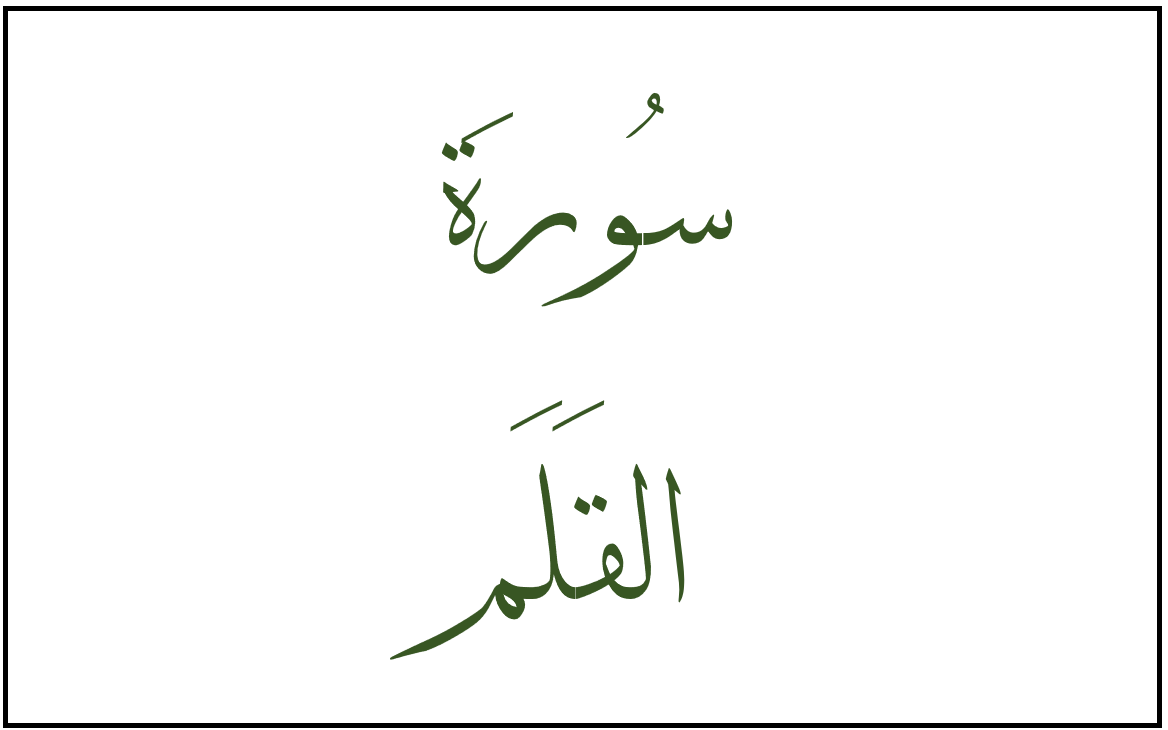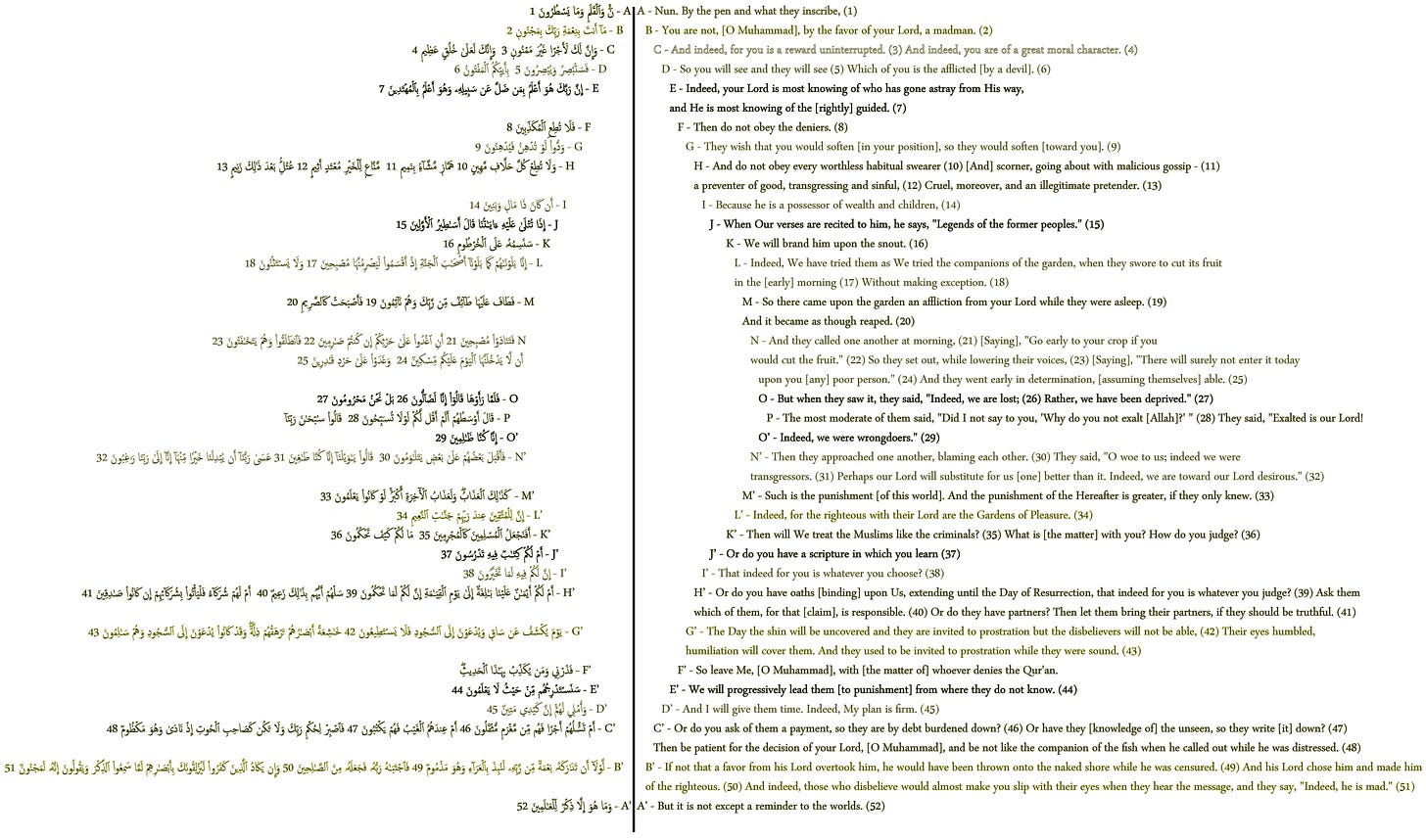

Discover more from Heavenly Order
Sūrah al-Qalam (The Pen) is a relatively short sūrah which is said to be revealed very early in the Messenger’s mission. It sits as the 68th sūrah in the Quran’s compiled order. It comes directly after Sūrah al-Mulk (which we’ve explored previously) and shares many thematic relationships with it.
Sūrah al-Mulk begins and ends with praise of Allah ﷻ, whereas Sūrah al-Qalam begins and ends with praise of the Messenger ﷺ.
Both suwar question the disbeliever about the Hereafter
Sūrah al-Mulk ends asking, “Consider this: whether Allah causes me and those with me to die or shows us mercy, who will save the disbelievers from a painful punishment?” while Sūrah al-Qalam begins (paraphrasing), “You’re slandering the one who is trying to save you!”
Sūrah al-Mulk asks the disbelievers in Hell, “Didn’t a warner come to you?” Sūrah al-Qalam demonstrates all the ways they went about denying their warner ﷺ.
Sūrah al-Mulk speaks of people in Hell expressing their regret after judgment has already come to pass. In contrast, Sūrah al-Qalam speaks of a group of people who express their regret while still alive and are thus able to repent for their bad actions.
Sūrah al-Mulk ends saying, “We will come to know who is in clear ḍalāl (misguidance). Sūrah al-Qalam begins with Allah ﷻ declaring, “No doubt, your Master is most knowledgeable of those who ḍalla (went astray) from My Path, and He is most knowledgeable of those who are guided.”
Sūrah al-Mulk concludes with the āyah, “Say, ‘Consider this: if your water were to sink ˹into the earth˺, then who ˹else˺ could bring you flowing water?’” Sūrah al-Qalam contains the story of the brothers who owned a garden, but had it destroyed because of their miserliness. They could not bring their garden back after their transgression.1
When viewed holistically, it appears Sūrah al-Qalam forms a ring structure. Click to zoom in.2
Because the connections are so granular, we will make the justifications for the links brief. For most of these, reading the Arabic/translation will be enough to understand the connection.
Connections
[A]/[A’] - The writing down of things with the pen is linked with mentioning and remembering.
[B/B’] - The Messenger ﷺ is told that he is not “bi-naʿmati rabbika bi-majnūn (by the favor of your Lord, insane).” Similarly, Prophet Jonah, in the linked passage, is saved because of a “niʿmatun min rabbi-hi (a favor from his Lord).” And the disbelievers are quoted as calling the Messenger ﷺ “majnūn (insane).”
[C]/[C’] - Both speak of the character and ‘ajr (reward) of the Messenger ﷺ.
[D]/[D’] - Both ominously warn of an impending punishment.
[E]/[E’] - Allah’s knowledge is contrasted with people’s ignorance.
[F]/[F’] - “Al-mukadhdhibīn (the deniers)” versus “yukadhdhibu (to deny).”
[G]/[G’] - The pagans asked the Messenger ﷺ to compromise on his message of submitting to one God, which he never did. On the Day of Judgment, they will be commanded to bow down to Allah ﷻ, but won’t be allowed to because they refused the offer in this life.
[H]/[H’] - The arrogance and false swearing [to do something] of a particular disbeliever is expanded and generalized to the arrogance and false oaths of the disbelieving population.
[I]/[I’] - People think wealth gives them the authority to act as they choose.
[J]/[J’] - Allah’s āyāt and revelation is contrasted with the lack of revelation and scripture that the pagans act with.
[K]/[K’] - The punishment is linked with Allah ﷻ questioning the disbelievers on how they judge and met out treatment.
[L/L’] - The jannah (garden) of the sinful brothers is contrasted with the jannah (garden) of the righteous.
[M']/[M’] - The punishment.
[N]/[N’] - At first the brothers are conspiring together. Later on they are blaming each other before eventually repenting together as well.
[O]/[O’] - What happened versus why it happened.
[P] - The sūrah appears to center on the speech of the brother who was “‘Awsaṭa-hum (most moderate of them)”. He asks why they didn’t take his advice to praise and remember Allah ﷻ.
Interestingly, the Arabic word ‘Awsaṭa - translated as “moderate” above - also contains the meaning of “middle.”3 We have previously seen this in our study of Sūrah al-Baqarah (The Cow), where Allah ﷻ calls Muslims a “ummatan wasaṭan (middle nation) in the middle āyah of that sūrah. And just as in Sūrah al-Baqarah, Sūrah al-Qalam also appears to mention the idea of being “moderate” in the center of its structure.
Sources
Thank you to Faris for sharing this structure with us on behalf of an anonymous acquaintance (and contributing in your own right). If you are the anonymous author of this structure, please reach out to us! We’d love to give you due credit.
Though, there are scholars of tafīr (scholarly interpretation of the Quran) who say the brothers got their garden back eventually, but only because of their regret and them turning back to Allah ﷻ.
This image was created using our newly acquired Adobe Illustrator program! Thank you to our paid subscribers whose help allowed us to make this investment! This and all future images will be made with Illustrator because these will feed into the Heavenly Order book being written and are able to scale without losing quality (even though this was exported as a PNG file, notice that it is still very high quality when zoomed in). If you’re not already a paid subscriber, please help out by clicking below!
Which is why some scholars opined that the brother speaking here was the middle child.
Subscribe to Heavenly Order
Exploring the Divine Structure and Coherence of the Quran. Join us as we dismantle the myth of the "disjointed" and "random" organization of Islam's Revealed Text.






